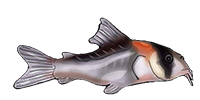Best Looking Algae Eater
Best Looking Algae Eater
I am setting up a 90 gallon tank within the next month. I will probably move either a bristlenose or pitball to the tank. I would like to get a second pleco to help clean. What would be a really good looking pleco (striking) to get that would do a respectable job in cleaning algae?
-
bronzefry
- Posts: 2198
- Joined: 31 Aug 2004, 16:01
- I've donated: $100.00!
- My articles: 6
- My images: 12
- My cats species list: 17 (i:0, k:0)
- My aquaria list: 7 (i:7)
- Spotted: 6
- Location 1: Sharon, Massachusetts, US
- MatsP
- Posts: 21038
- Joined: 06 Oct 2004, 13:58
- My articles: 4
- My images: 28
- My cats species list: 117 (i:33, k:0)
- My aquaria list: 10 (i:8)
- My BLogs: 4 (i:0, p:164)
- Spotted: 187
- Location 1: North of Cambridge
- Location 2: England.
Unfortunately, nearly all really good algae eaters are some combination of the following:
1. Growing really huge.
2. Generally brown/grey in colour.
This is because algae generally only grow in places where there's lots of sunlight - shallow water in other words, which in turn means that the fish eating the algae needs to be pretty good at hiding in this environment. Following this through, the fish needs to be pretty drab in colour, because it would not be able to hide well if it's brightly coloured.
Brightly coloured species are this that live at quite deep levels - for instance lives at around 15 meters depth. Not much algae available at this depth, because it would be almost entirely dark down there.
--
Mats
1. Growing really huge.
2. Generally brown/grey in colour.
This is because algae generally only grow in places where there's lots of sunlight - shallow water in other words, which in turn means that the fish eating the algae needs to be pretty good at hiding in this environment. Following this through, the fish needs to be pretty drab in colour, because it would not be able to hide well if it's brightly coloured.
Brightly coloured species are this that live at quite deep levels - for instance lives at around 15 meters depth. Not much algae available at this depth, because it would be almost entirely dark down there.
--
Mats
-
Beersnob
- Posts: 177
- Joined: 24 Nov 2003, 00:17
- Location 1: Royal Oak, Michigan
- Interests: Drinking Beer, Brewing Beer, Drinking Mead, Mazing Mead, hiking, Backpacking, fishing, camping, and of cource Catfish!
Also, the long-finned bristlenoses are very, very nice to look at.
And there are always variations on the rubberlipped plecos. A LFS around here (Detroit, MI) sells some spotted rubberlipped plecos.
But as always, there are only 700 plus species of Loricardae...HAPPY HUNTING!
Thanks,
Scott
Beersnob
Sooo many Beers, So little time!
How many Catfish are in your Tank?
Sooo many Beers, So little time!
How many Catfish are in your Tank?
- MatsP
- Posts: 21038
- Joined: 06 Oct 2004, 13:58
- My articles: 4
- My images: 28
- My cats species list: 117 (i:33, k:0)
- My aquaria list: 10 (i:8)
- My BLogs: 4 (i:0, p:164)
- Spotted: 187
- Location 1: North of Cambridge
- Location 2: England.
Zebra Oto's are very beautiful, and if the other occupants of the tank are either small-ish or not eating other fish, they would be fine.
Rubberlip pleco's = Chaetostoma species - These come from higher altitude in the Andes, and they require cooler temperature and high dissolved oxygen levels. Great algae-eaters, but you have to be careful that they don't get low on oxygen, because they aren't quite as able to cope as most other pleco's.
--
Mats
Rubberlip pleco's = Chaetostoma species - These come from higher altitude in the Andes, and they require cooler temperature and high dissolved oxygen levels. Great algae-eaters, but you have to be careful that they don't get low on oxygen, because they aren't quite as able to cope as most other pleco's.
--
Mats





